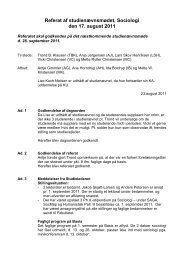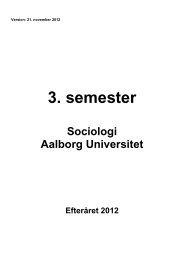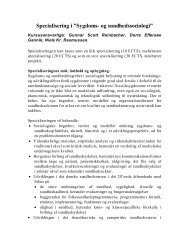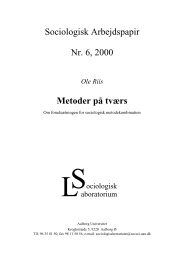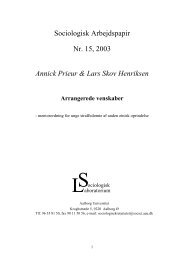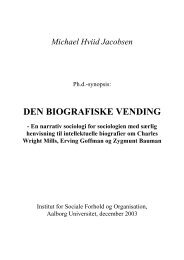Utopianism in the Work of Zygmunt Bauman - Sociologi - Aalborg ...
Utopianism in the Work of Zygmunt Bauman - Sociologi - Aalborg ...
Utopianism in the Work of Zygmunt Bauman - Sociologi - Aalborg ...
You also want an ePaper? Increase the reach of your titles
YUMPU automatically turns print PDFs into web optimized ePapers that Google loves.
<strong>in</strong>controvertible truth but <strong>in</strong>stead po<strong>in</strong>ts out that <strong>the</strong>re are many truths depend-<br />
<strong>in</strong>g on one’s po<strong>in</strong>t <strong>of</strong> vantage or <strong>the</strong> eye <strong>of</strong> <strong>the</strong> beholder. Alphonse de Lamar-<br />
t<strong>in</strong>e, <strong>the</strong> French Romantic and Enlightenment poet and statesman, noted that<br />
‘utopias are <strong>of</strong>ten only premature truths’ (Toura<strong>in</strong>e 2000:26). Whe<strong>the</strong>r or not<br />
this is <strong>the</strong> case, only posterity can determ<strong>in</strong>e but <strong>the</strong> important th<strong>in</strong>g is that uto-<br />
pians <strong>of</strong>ten strive to make <strong>the</strong>ir ideas come true, to make <strong>the</strong>m <strong>in</strong>to ‘hard’ real-<br />
ity at some po<strong>in</strong>t <strong>in</strong> time <strong>in</strong>stead <strong>of</strong> allow<strong>in</strong>g <strong>the</strong>m to stay with<strong>in</strong> <strong>the</strong> realm <strong>of</strong><br />
‘s<strong>of</strong>t’ thought. This k<strong>in</strong>d <strong>of</strong> Enlightenment th<strong>in</strong>k<strong>in</strong>g was expressed no more ex-<br />
plicitly than by Leibniz who contended that ‘<strong>the</strong> present <strong>in</strong> pregnant with <strong>the</strong><br />
future’. <strong>Bauman</strong> would agree with this presupposition, although he would <strong>in</strong>sist<br />
on <strong>the</strong> use <strong>of</strong> ‘futures’ <strong>in</strong> <strong>the</strong> plural <strong>in</strong>stead <strong>of</strong> <strong>in</strong> <strong>the</strong> s<strong>in</strong>gular, but turn aga<strong>in</strong>st<br />
what he would regard as modernist th<strong>in</strong>k<strong>in</strong>g if <strong>the</strong>se ideas by virtue <strong>of</strong> be<strong>in</strong>g<br />
ideas by some logic <strong>of</strong> necessity or historical <strong>in</strong>evitability had to be turned <strong>in</strong>to<br />
reality. He <strong>of</strong>ten illustrates this modernist preoccupation with turn<strong>in</strong>g ideas <strong>in</strong>to<br />
reality and mak<strong>in</strong>g dreams come true when quot<strong>in</strong>g <strong>the</strong> famous words <strong>of</strong><br />
Jacques Ellul regard<strong>in</strong>g technology when he stated that everyth<strong>in</strong>g be<strong>in</strong>g tech-<br />
nologically possible at some po<strong>in</strong>t <strong>in</strong> time would be carried out merely from <strong>the</strong><br />
fact <strong>of</strong> be<strong>in</strong>g possible. These endless dreams <strong>of</strong> enforc<strong>in</strong>g <strong>the</strong> possible have <strong>the</strong><br />
bad habit <strong>of</strong> becom<strong>in</strong>g nightmares, which <strong>in</strong> turn has devalued <strong>the</strong> desirability<br />
<strong>of</strong> dream<strong>in</strong>g: “With too many successive dreamworlds remembered mostly for<br />
<strong>the</strong> pa<strong>in</strong>ful scars <strong>the</strong>y left, <strong>the</strong> very activity <strong>of</strong> dream<strong>in</strong>g has been cast <strong>in</strong>to dis-<br />
repute” (<strong>Bauman</strong> 1992c:101).<br />
In short, modernity, <strong>in</strong> <strong>Bauman</strong>’s exposition <strong>of</strong> this historical epoch, was a<br />
matter <strong>of</strong> try<strong>in</strong>g hard to impose utopian bluepr<strong>in</strong>ts on reality, enforc<strong>in</strong>g notions<br />
<strong>of</strong> <strong>the</strong> ideal society through bureaucratic plann<strong>in</strong>g rang<strong>in</strong>g from legislation<br />
processed by <strong>in</strong>tellectuals, urban and architectural plann<strong>in</strong>g and <strong>the</strong> social engi-<br />
neer<strong>in</strong>g <strong>in</strong>volved <strong>in</strong> all spheres <strong>of</strong> life. He <strong>of</strong>ten cites Leon Battista Alberti for<br />
<strong>the</strong> assumption that <strong>in</strong> <strong>the</strong> modern m<strong>in</strong>d <strong>the</strong> ‘perfect society’ is one <strong>in</strong> which<br />
21



